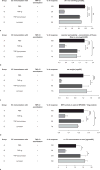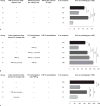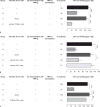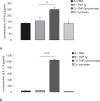Epicutaneous immunization with TNP-Ig and Zymosan induces TCRαβ+ CD4+ contrasuppressor cells that reverse skin-induced suppression via IL-17A
- PMID: 24993442
- PMCID: PMC4141016
- DOI: 10.1159/000363446
Epicutaneous immunization with TNP-Ig and Zymosan induces TCRαβ+ CD4+ contrasuppressor cells that reverse skin-induced suppression via IL-17A
Abstract
Background: Our previous work showed that epicutaneous (EC) immunization with protein antigen e.g. TNP-conjugated mouse immunoglobulin (TNP-Ig) in the form of a patch prior to hapten sensitization inhibits Th1-mediated contact hypersensitivity (CHS) in mice. We also found that suppression of CHS was mediated by TCRαβ+ CD4+ CD8+ T suppressor cells producing TGF-β. The aim of this study was to investigate the role of innate immunity in the suppression of CHS.
Methods: Mice were immunized by applying gauze patches containing protein antigen alone or in the presence of zymosan, and were then tested for the CHS response. Adoptive cell transfer experiments were used to study the mechanisms involved in the reversal of skin-induced suppression. The influence of EC immunization on cytokine production by lymph node cells was measured by ELISA.
Results: We found that EC immunization with TNP-Ig and zymosan before trinitrophenyl chloride sensitization reverses skin-induced suppression, demonstrated in vivo and in vitro. The reversal of skin-induced suppression was transferable by antigen-specific TCRαβ+ CD4+ T contrasuppressor cells. Furthermore, we showed that the contrasuppression was IL-17A-dependent and TLR2- and MyD88-independent.
Conclusions: Our work strongly suggests that EC immunization with protein antigen and zymosan reverses skin-induced suppression and that this approach may be a potential tool to increase the immunogenicity of weakly immunogenic antigens.
© 2014 S. Karger AG, Basel.
Figures









References
-
- Askenase PW, Szczepanik M, Itakura A, Kiener C, Campos RA. Extravascular T-cell recruitment requires initiation begun by Vα14+ invariant NK T cells and B-1 cells. Trends Immunol. 2004;25:441–449. - PubMed
-
- Szczepanik M, Bryniarski K, Tutaj M, Ptak M, Skrzeczynska J, Askenase PW, Ptak W. Epicutaneous immunization induces αβ T-cell receptor CD4 CD8 double-positive non-specific suppressor T cells that inhibit contact sensitivity via transforming growth factor-β. Immunology. 2005;115:42–54. - PMC - PubMed
-
- Ptak W, Szczepanik M, Bryniarski K, Tutaj M, Ptak M. Epicutaneous application of protein antigens incorporated into cosmetic cream induces antigen-nonspecific unresponsiveness in mice and affects the cell-mediated immune response. Int Arch Allergy Immunol. 2002;128:8–14. - PubMed
-
- Majewska-Szczepanik M, Zemelka-Wiącek M, Ptak W, Wen L, Szczepanik M. Epicutaneous immunization with DNP-BSA induces CD4+ CD25+ Treg cells that inhibit Tc1-mediated CS. Immunol Cell Biol. 2012;90:784–795. - PubMed
-
- Zemelka-Wiącek M, Majewska-Szczepanik M, Ptak W, Szczepanik M. Epicutaneous immunization with protein antigen induces antigen-non-specific suppression of CD8 T cell mediated contact sensitivity. Pharmacol Rep. 2012;64:1485–1496. - PubMed
Publication types
MeSH terms
Substances
Grants and funding
LinkOut - more resources
Full Text Sources
Other Literature Sources
Research Materials

